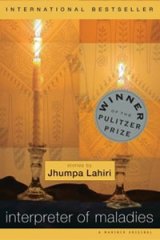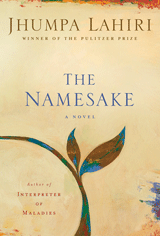 For me, one of the great things about literary awards is discovering the work of authors which might otherwise have passed me by. The Man Booker Prize longlist, for example, recently brought Jhumpa Lahiri to my attention. After reviewing ‘Unaccustomed Earth‘ just a few weeks ago, I got hold of copies of her first collection of short stories ‘Interpreter of Maladies’ which won the Pulitzer Prize in 2000 and her first novel ‘The Namesake’ published in 2003. I am now hoping that Lahiri’s new Booker Prize shortlisted novel ‘The Lowland’ lives up to my increasingly high expectations.
For me, one of the great things about literary awards is discovering the work of authors which might otherwise have passed me by. The Man Booker Prize longlist, for example, recently brought Jhumpa Lahiri to my attention. After reviewing ‘Unaccustomed Earth‘ just a few weeks ago, I got hold of copies of her first collection of short stories ‘Interpreter of Maladies’ which won the Pulitzer Prize in 2000 and her first novel ‘The Namesake’ published in 2003. I am now hoping that Lahiri’s new Booker Prize shortlisted novel ‘The Lowland’ lives up to my increasingly high expectations.
This is a sort of two-in-one book review partly in an effort to catch up on my reviews after a break from blogging and partly because it is easier to review two books by the same author together especially after reading them back to back. Moreover, my thoughts about ‘Interpreter of Maladies’ were virtually the same as my thoughts about ‘Unaccustomed Earth’ and I don’t want to repeat myself too much. The stories which stood out for me in this particular collection were ‘A Temporary Matter’ and ‘Sexy’. Lahiri writes about many different types of family relationships but I think her real strengths lie in those stories which focus on struggling young married couples and the point when the cracks start to show. Overall, I thought both collections were very strong and I really enjoyed Lahiri’s understated observations about family life.

When I started reading ‘The Namesake’, I suspected that it too had originally begun life as a short story and according to Wikipedia (that well-known source of reliable information), it seems that I was right. ‘The Namesake’ tells the story of Gogol Ganguli, born in 1968 to Indian immigrants in Massachusetts. Named after his father’s favourite author, Gogol’s unconventional name has many implications for him in several different episodes throughout his life from early childhood to adulthood allowing the link between names and identity to be thoroughly examined from a number of different angles.
At just under three hundred pages, ‘The Namesake’ is not a particularly long novel yet it felt like so much happened in that time. Lahiri’s writing is somehow plain yet also very detailed at the same time. This makes the pace of the story quite slow but in a leisurely way rather than a frustratingly sluggish way. As Lahiri is probably more famous for her short stories, I was not expecting to like ‘The Namesake’ as much as her other work but once again, I found myself being very drawn in by the story as further layers continued to be added to the characters.
When I reviewed ‘Unaccustomed Earth’, I commented that Lahiri works with quite a narrow set of themes based primarily on the experiences of Bengali immigrants in the US. Having now read three books by Lahiri, this appears to be the case in her other work and from what I’ve heard, her new novel ‘The Lowland’ looks as though it is more of the same too. However, I don’t think this is necessarily a bad thing as Lahiri is very good at what she does and I am very much looking forward to reading her latest effort.





You are absolutely right about awards (as well as short lists, long lists etc associated with them) for catching wind of great books that might otherwise be overlooked. I’m a member of the National Book Critics Circle (NBCC) myself which makes annual awards in the same vein as The Booker and am always surprised at some of the wonderful titles I’d missed that other members put forth as award candidates in any given year. Good post!
LikeLike
http://www.theguardian.com/film/2007/mar/30/worldcinema.bollywood
I saw the movie based on the book, The Namesake when it first came out and thought it to be very poignant. I prefer to read the book before the movie, obviously in this instance this didn’t happen however after reading your review I feel lnspired to seek out the book for my inventory (to be placed in the ‘near future’ category).
There is so much good writing to be discovered and I agree that the long lists of the various awards can be a woderful introduction to ‘new to me’ authors. As an aside, the movie The Namesake introduced me to Gogol.
LikeLike
I actually studied The Namesake in my final year of high school as part of our dreaded ‘Belonging’ unit. Unfortunately this pretty much quashed any enjoyment I could have experienced, but maybe I should give Lahiri another try 😛
LikeLike
I have not read her short story collections yet but I did read The Namesake, and felt the same way you do about it. I liked it but didn’t love it, and plodded through more than I expected to. I read an advance copy of The Lowland last month (hope it is not tasteless for me to include it but I wrote a post about it here should you be interested: http://onlyoublog.com/2013/08/14/jhumpa-lahiris-the-lowland/) and really enjoyed it. Her writing seemed different, I thought, and I enjoyed it much more this time around. It was actually a bit of a page-turner for me. I hope you will like it and not be disappointed.
LikeLike
I confess The Namesake was a little disappointing to me. I think it would have worked better as a novella
LikeLike
I love ‘A Temporary Matter’ as well, but the whole collection is outstanding, I think, and I am no lover of the short story format. I’ve seen two very different reviews of ‘The Lowland’ and it has been interesting watching the way in which the betting on the Booker has fluctuated. Initially this was the favourite but I see that now that place is occupied by the Crace novel. Whatever the reviews, however, I shall read it as soon as I can get hold of a copy.
LikeLike
Interpreter of Maladies was probably the first short story collection that really ensnared me. For so many years I passed over short story collections in favor of novels, but reading these stories, I was totally sold on short stories, and I never looked back. I’ve been meaning to read The Namesake forever–I’ll definitely have to pick it up.
LikeLike
I recently reviewed a book reading by Jhumpa Lahiri on my blog. You will likely find it interesting as she is taking her writing in a new direction.
LikeLike
Pingback: The Man Booker Prize Shortlist Readings | A Little Blog of Books and Other Stuff
Pingback: The 2013 End of Year Book Survey | A Little Blog of Books and Other Stuff
I loved your review. I loved Interpreter of Maladies more than Unaccustomed Earth because of the sheer length of the stories in the latter: they seemed too drawn-out. That feeling persisted when I read The Namesake; though the characters were vivid and interesting, the point where the “cracks start to show” seemed like the entire novel and I think the narrative suffered. I think Lahiri excels at snappy short stories, but maybe The Lowland will be a turning point for me.
LikeLike
Ah, I, too, thoroughly enjoyed “Interpreter of Maladies” and would pick ‘Sexy’ out as one of the strongest stories in the book. Lahiri amazes me with the intricacy of her stories, in ‘Sexy’ in particular I liked how she crossed the lives of the coworkers. It is clear that Lahiri knows her characters and stories on the deepest levels possible to place all these strings and never trip herself. I revel in the short story for this reason. Alice Munro is another of my favorite short story writers and i am hoping that more people will recognize the genius that is the short story when written by these two women, at least!
LikeLike
Pingback: The Lowland by Jhumpa Lahiri | A Little Blog of Books and Other Stuff